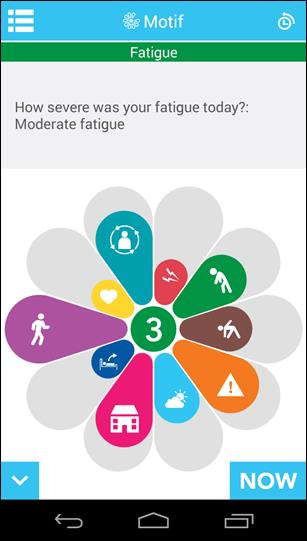Session Information
Date: Sunday, November 8, 2015
Session Type: ACR Poster Session A
Session Time: 9:00AM-11:00AM
Background/Purpose: Previous research has attempted to study the association between weather and joint pain. Inconclusive results may be due, in part, to infrequent measures of pain and poor quality weather data. Patients’ own smartphones present an opportunity for frequent data collection with parallel usage of global positioning satellite (GPS) technology to pull local weather data. This pilot study aimed to assess the feasibility and acceptability of symptom and weather data collection using a smartphone application (app).
Methods: Twenty adult patients with rheumatoid arthritis were recruited from a single rheumatology centre. The app was co-designed with 14 participants in conjunction with a pre-existing platform by uMotif. Patients were asked to report six symptom scores every evening (pain, morning stiffness, tiredness on waking, fatigue, wellbeing and overall disease severity) on a 1–5 scale for the past 24 hours, for 60 consecutive days. In addition, they reported four other factors (mood, physical activity, time spent outside and perceived influence of the weather). All ten scores were collected on a single screen using a visual ‘motif’ (figure). GPS data was collected hourly and weather data was pulled from the closest Met Office weather station. Weather variables were summarised for each patient-day.
Ongoing engagement was measured as: the number of study withdrawals; mean completion rate (mean proportion of days with at least one score out of time in study); and the proportion of eligible patients who completed 0–1, 2–4 or 5–7 entries per week. The completeness of weather data was measured as the proportion of days any weather data was collected.
Results: 5 male and 15 female patients were recruited (mean age 54.7). Dropout rate was 30%, (weeks 0, 1, 4, 4, 5 and 6) and reasons given were personal, technical and health issues. At the time of reporting, full eight week follow-up data were available for 11/14 patients. Mean completion rate was 73%. Patients reported scores ≥ 5 days per week 64% of the time and 86% of the time patients reported scores ≥ 2 times per week. Weather data were available for 80% of symptom reports.
Conclusion: Patient engagement with the app was high. Although six patients withdrew from the study, the remainder regularly reported symptoms over a two-month period.Weather data were successfully extracted from GPS data. This pilot study is proof of concept that this novel mode of data collection can be used for research and will inform a future larger study. Concurrent qualitative work will assess reasons for dropout and motivators for ongoing engagement.
Table Proportion of patients with regular data entry, by week
|
Week number |
Number of patients in study |
Number of participants entering data (percentage) |
||
|
0–1 times per week |
2–4 times per week |
5–7 times per week |
||
|
1 |
19 |
0 (0%) |
4 (21%) |
15 (79%) |
|
2 |
18 |
1 (6%) |
3 (17%) |
14 (78%) |
|
3 |
18 |
3 (17%) |
4 (22%) |
11 (61%) |
|
4 |
18 |
4 (22%) |
3 (17%) |
11 (61%) |
|
5 |
16 |
3 (19%) |
4 (25%) |
9 (56%) |
|
6 |
14 |
4 (29%) |
4 (29%) |
6 (43%) |
|
7 |
12* |
2 (17%) |
3 (25%) |
7 (58%) |
|
8 |
11* |
1 (9%) |
2 (18%) |
8 (73%) |
|
* Shows incomplete follow-up for two and three patients respectively |
||||
Figure uMotif app
To cite this abstract in AMA style:
Reade S, Sergeant JC, Sperrin M, Schultz DM, Spencer K, Sanders C, Dixon WG. Feasibility Study of Smartphone Data Collection for Cloudy with a Chance of Pain: Sustained Engagement for Daily Self-Reporting of Disease Severity in Rheumatoid Arthritis over Two Months [abstract]. Arthritis Rheumatol. 2015; 67 (suppl 10). https://acrabstracts.org/abstract/feasibility-study-of-smartphone-data-collection-for-cloudy-with-a-chance-of-pain-sustained-engagement-for-daily-self-reporting-of-disease-severity-in-rheumatoid-arthritis-over-two-months/. Accessed .« Back to 2015 ACR/ARHP Annual Meeting
ACR Meeting Abstracts - https://acrabstracts.org/abstract/feasibility-study-of-smartphone-data-collection-for-cloudy-with-a-chance-of-pain-sustained-engagement-for-daily-self-reporting-of-disease-severity-in-rheumatoid-arthritis-over-two-months/

